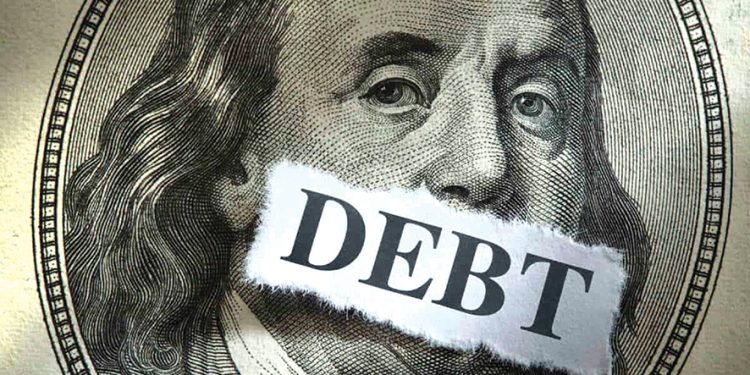National debt. Who will pay for it? The working force (taxpayers) that a nation has, or will have in the future, that’s who! Conventional knowledge has it that national debt materializes when spending in the country exceeds its tax incomes and other revenues. Governments usually borrow a certain amount of money to cover the expenses accumulated over a definite period of time. It is an outstanding balance to be paid off by the government at some point in time, which is, in some ways, comparable to any rank-and-file’s debt on mortgage, automobile, refrigerator, TV set, or any other item of the sort, or on credit card purchases, in which case, the full balance is not paid off each month.
National debt tends to rise as gross domestic product shrinks, which mostly happens during recessions and their aftershocks, which usually instigates prolonged detrimental economic effects. Even worse news is that any debt, in any form, be it personal or governmental, accrues interest, and that has to be covered too.
Bonds make a horse of a totally different color, and could be a theme of their own article. National debt increases when governments suffer the steadily appearing deficit in the budget, which persists if spending exceeds the amount paid off. Yes, the picture is as dreadful as that, but the devil is never quite as black as it is painted – those scary deficits are normally reduced by annual budget surpluses.
Georgia’s foreign debt has grown by 1.67 billion GEL to 24.19 billion
There is no debt-free nation in the world, not even the strongest and richest ones: the national debt of the United States equaled something over $35 trillion by the fiscal period of August 2024. It is unlikely that America will ever be able to pay this much money back to its creditors (public, foreign governments, banks and investors), but, amazingly enough, the country continues living happily, spending hundreds of billions on unlikely projects, its population is not quite aware that they have so deeply plunged into national debt. Indeed, most don’t have a clue what national debt is, likely because it is not specifically felt in their everyday lives and does not specifically hit their pockets, even though national debt has a direct effect on the country’s gross domestic product and its sustainability. Bizarre, but true!

Sakartvelo is no exception in this familiar, unsavory but long-standing pecuniary exigency. In August 2024, the Ministry of Finance of Georgia promulgated a document that statistically reflected the structure of the country’s foreign debt. According to the paper, the debt at this very moment amounts to $8.98 billion, which is $410 million higher than it was in the last fiscal year. This means that Georgia’s foreign debt has grown by 1.67 billion GEL to 24.19 billion, inflicted by inflation, analogous to the local currencies of almost any other country of the world.
Compared to the previous year, Georgia’s tourism has grown by 4.5% and reached 5.4 million visits in the last nine months.
Georgia’s biggest creditor is the Asian Development Bank, with $2 billion, 360 million borrowed for executing the largest infrastructure projects in the land. The second biggest investor is the World Bank with $2 billion, 170 million credited to Georgia for the same purpose. The third biggest creditor is the European Investment Bank with $1 billion, 140 million. The rest of our national debt is allocated among other banks, foundations and alliances, like EBRD and the European Union, as well as certain individual countries like France, Germany, Japan, Austria, Russia, USA, Turkey, etc., enumerated in the increasing order of the amount of money borrowed from them.
One of the most lucrative ways for Georgia to pay off its debt is tourism, and the field seems to be promising enough to clear the burden away, partially, of course. The flow of tourists has increased, although the tourism geography has changed- the Eastern European nations remaining among the largest “donors.” Compared to the previous year, Georgia’s tourism has grown by 4.5 percent and reached 5.4 million visits in the last nine months. Hopefully, after the upcoming overstrained electoral spell, the figure will increase even further. Although we don’t hear over the media about anything but the current electoral bouts, life continues in its own habitual conduit, the economy generating revenues and the standard of living not suffering too much.
Back to the nature of national debt, some might think that it is not a big deal, because every so often, debts get cancelled. Even so, with bankruptcy not looming on the horizon, governments usually pay the debts off on their own, and this is good, because it is better to have a debt and be solvent than be bent under that weighty pain in the neck, and eventually go bankrupt. Thank god Sakartvelo is in the first category. So far, so good!
Op-Ed by Nugzar B. Ruhadze














